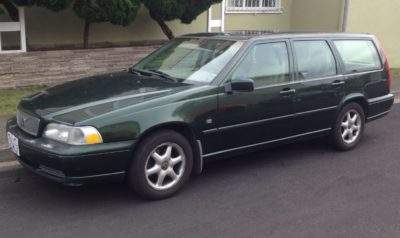Let’s Get You The Facts About These Car Insurance Myths
There are so many car insurance myths out there and sometimes it can be hard to determine what is true and what is not. It is important to be informed about insurance as it is all about your protection and, frankly, what is more important than that?
Here are 10 of the most common car insurance myths answered by insurance brokers (and 2 bonus myths if you make it all the way to the bottom).
Parking tickets do not affect your car insurance premium. When you are getting an insurance quote for your vehicle, insurance companies do not know whether you have one, 10, or more parking tickets. Parking tickets do not appear on the details that insurance companies review when determining your insurance premium.
Be aware, however, that unpaid parking tickets can cause you problems when you want to renew the plates for your vehicle. When you renew your licence plate, you will have to pay any outstanding parking fines before you will receive the renewal.
2. Do Parking Tickets Affect My Demerit Points?
No. Parking tickets do not incur demerit points. There are, however, other traffic violations, such as speeding, which, if you are convicted, will result in demerit points. Ontario’s Ministry of Transportation is a great resource if you’re looking for a full explanation on demerit points and, by the way, for those who travel by car and may have a driving violation conviction from another province or New York or Michigan states, demerit points can impact you.
3. Do Red Cars Cost More To Insure?
Red cars do not cost more to insure. The colour of your vehicle does not affect the price of car insurance. What does impact your car insurance premium are factors such as your driving record and driving history, how far you drive, what your car is used for (such as pleasure or business), the make, model and year of your car, and where you live. These and other factors are significant considerations when determining the cost of your car insurance.
The Insurance Bureau of Canada also notes that “the harder your car is to steal and the less expensive it is to repair, the less you pay for insurance.” In fact, auto insurance theft is such a costly problem for the insurance industry that the Insurance Bureau of Canada produces a list each year on the top 10 most stolen vehicles!
A driver’s car insurance often is lower by age 25 because the driver has more driving experience, however, a bad driving history can mean higher rates at this age.
When it comes to car insurance, age is a major factor in the determination of car insurance premiums. And, generally speaking, your rates get lower as you gain driving experience. There are, however, other major factors at play that will affect your insurance premium.
5. Does Driving An Older Car Mean My Insurance Will Be Lower?
Your car insurance premium may be lower if you drive an older car, however, a car’s age is only one factor in calculating your premium. There are a number of other important factors in determining your auto insurance premium including the make, model and year of your vehicle, how you use your vehicle, your driving history, and age, just to name a few.
If you drive an older car, you could likely save a fair amount of money by dropping collision coverage and/or comprehensive coverage on your vehicle. Generally, the need for these coverages drops as your car ages. You need to determine if your vehicle is valuable enough to merit having these coverages. A discussion with an insurance broker will help you to determine this. Expert insurance advice is very useful when you are considering the value of collision and comprehensive insurance on an older vehicle.

Your car insurance premium may be lower if you drive an older car.
6. Does Car Insurance Work The Same Across All Provinces In Canada?
Car insurance does not work the same way across all provinces in Canada. Personal auto insurance is required by law across Canada, however, insurance delivery, rates, coverages, and other details vary. Some provinces in Canada have public systems and others have private systems. Some provinces have higher rates than others. Required minimum coverage also varies, just to name a few differences.
The good news is that if you have Ontario auto insurance on your vehicle, you will have insurance coverage when you travel to another province. Ontario has a no-fault insurance system which means that regardless of who caused an accident, the insurance company you are insured with looks after your claim.
Ontario auto insurance also has mandatory uninsured automobile coverage. This means that you, as an Ontario driver, and some family members, are covered to the limit of your insurance liability coverage if you are in an accident with someone who has no insurance coverage.

Car insurance does not work the same way across all provinces in Canada.
7. Is the Best Car Insurance Coverage Expensive?
The best insurance coverage provides you with the right protection, and what you need may not be the most expensive policy. The best insurance coverage varies based on your specific needs. For example, one person may want to have $1 million in liability coverage on their auto insurance policy. Someone else will want $2 million in liability coverage. Yes, it is true that more car insurance coverage costs more money. However, insurance brokers are trained and qualified to explain different insurance coverages to you so you can decide which coverages you want to purchase.
It is also true that the least expensive insurance policy could end up being the most expensive policy you ever buy. This is true because if you purchase insurance based on price alone without knowing the details of the policy, you may find in the event of a claim you are not covered or you are covered with limitations. In this situation, if you have no coverage or limited coverage, you will have to pay for the claim yourself or pay anything above the policy limit. This can be very expensive.
8. Will It Affect My Insurance If Someone Borrows My Car And Gets In An Accident?
If someone borrows your car and gets in an accident, your insurance will be impacted. The accident will likely be on your driving record and your auto premium could rise. Your auto insurance travels with your vehicle. When you lend your car to someone, you are responsible for whatever happens.
Here are a few things to consider when lending your car to someone:
- Be sure the person using your vehicle has a valid driver’s licence
- Be sure the person you are lending the car to will not allow anyone else to drive it
- Check that the vehicle ownership is in the car and that the auto insurance is valid. Have proof of insurance in the car or an electronic pink slip available to the driver
- If someone – even if they live in the same house as you – is borrowing your car and driving it on a regular basis, be sure to let your insurance broker know. It may be advisable to include this person on the car insurance policy and failure to do so could invalidate your insurance

If someone borrows your car and gets in an accident, your insurance will be impacted.
9. Does My Auto Insurance Cover Business Use Of My Car?
Most personal car insurance policies do not cover the business use of your vehicle. The insurance company prices your car premium for personal use and does not include coverages for risks that may arise with business use. Speak to an insurance broker who will ask for details on the business use of your vehicle and can get you insurance that covers this use. Be aware that failing to disclose the business use of your personal vehicle can invalidate your insurance. A claim may be denied and you may find yourself without insurance coverage.
Let’s say you happen to drive to a meeting for your business and you use your car. If this is not the norm, your personal car insurance can cover this. If, on the other hand, you often use your car to deliver items for your work or your business (including Uber, Skip The Dishes, and other similar services) or if you go to worksites regularly, you should speak to an insurance broker to get the right insurance to cover business use.
10. Is The Minimum Car Insurance Required By Law Good Enough?
The minimum car insurance required by law is often not enough to ensure you are properly covered. Ontario law requires that if you own a vehicle you must have at least a standard auto insurance policy. The main coverages of an auto insurance policy are third-party liability coverage, statutory accident benefits coverage, direct compensation – property damage coverage, and uninsured automobile coverage. There are minimum levels of coverage, however, in most cases, the minimum levels of coverage are not enough. You can increase your coverage and have many choices to purchase additional coverage that fits your needs.
Bonus 11: Does No-Fault Car Insurance Mean It’s Never My Fault?
No-fault insurance means no matter who is at fault, your insurance company looks after your claim including damages or injuries to you. No-fault insurance involves the way in which insurance claims are looked after. For example, in an accident, your insurance company looks after your claim and the other person’s insurance company looks after their claim. In no way does no-fault mean that it’s never your fault or no one will be found to be at fault. Negligence will be determined and the person who is deemed to be at fault will probably see their insurance rates go up. Fault can be determined to be held by more than one person and maybe split among the parties.
So why does Ontario have no-fault insurance? No-fault insurance helps to get claims settled more quickly because the insurance companies look after the claims of their customers.
Yes. Speeding tickets can impact your insurance. It’s the severity and frequency of speeding tickets that matter the most when it comes to your insurance premium. Once a speeding ticket is on your record, it can impact your insurance for up to 3 years.
If a police officer said your speeding ticket will not affect your insurance, the officer is wrong. Police officers are not insurance experts. The police officer you may be speaking to may not be aware of how many speeding tickets you have on your record. Minor and infrequent tickets may have a minor impact on your insurance. More serious speeding violations can be mean a larger impact. The faster the speeding and the more dangerous the driving, the more severe the ticket and the worse the impact will be on your insurance. Some companies provide ‘forgiveness’ and will not increase your rates after one speeding conviction.

Speeding tickets can impact your insurance.
Ensure You Are Properly Covered
Insurance brokers know there are plenty of car insurance myths are out there. They know what is true and what is not when it comes to auto insurance. Insurance brokers are licenced professionals. If you hear something about auto insurance that doesn’t seem right, it may be a car insurance myth. An insurance broker can help you determine if something is a car insurance myth or not. An insurance broker will explain details of auto insurance coverage, review coverages and options to increase coverages. We are here to advise and assist.
Morison Insurance is an award-winning team of insurance brokers providing the best insurance and service for our customers. We are here to help. We have nine offices to serve you, we are available by phone, email and online. We have a 24-hour claims service and we are here to help resolve any claims you may have. We will shop at dozens of insurance companies to get you competitively-priced insurance coverage tailored to your individual lifestyle.
We encourage you to read more about our team, our insurance product offerings, and to read what customers are saying about us on Google, Facebook and Yellow Pages reviews!
This content is written by our Morison Insurance team. It is provided for general information only. Insurance needs differ from person to person, and this article is therefore not a substitute for professional advice about your individual insurance needs which can be obtained by speaking to one of our brokers.
This content is written by our Morison Insurance team. All information posted is merely for educational and informational purposes. It is not intended as a substitute for professional advice. Should you decide to act upon any information in this article, you do so at your own risk. While the information on this website has been verified to the best of our abilities, we cannot guarantee that there are no mistakes or errors.


